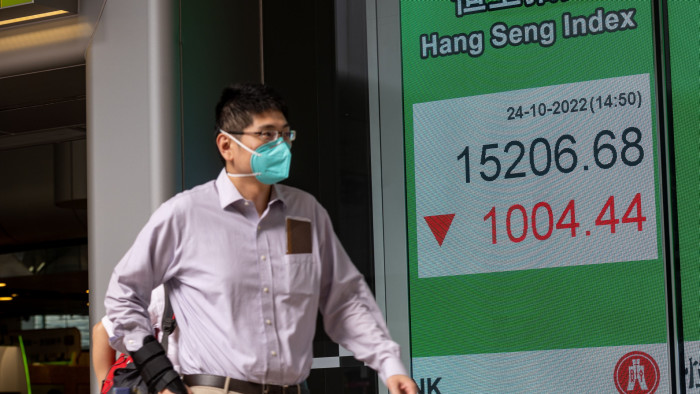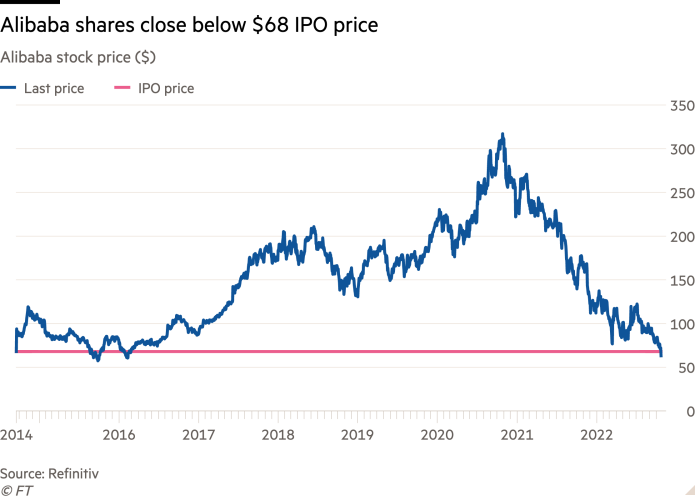China bulls hammered by stock rout as Xi Jinping consolidates power

Roula Khalaf, Editor of the FT, selects her favourite stories in this weekly newsletter.
Chinese stocks popular with big fund managers have been hammered by a significant sell-off following confirmation of President Xi Jinping’s third term in power, suggesting billions of dollars of losses for those who stuck by their portfolios.
The Nasdaq Golden Dragon index, which tracks US-listed shares in Chinese companies, shed 14.4 per cent on Monday in its largest one-day fall on record, bringing its decline to about 50 per cent this year. Stocks such as Alibaba, JD.com and Pinduoduo all tumbled.
Hong Kong’s benchmark Hang Seng index suffered its biggest single-day drop since November 2008 on Monday. It declined as much as 1.6 per cent in early trading on Tuesday, while China’s CSI 300 fell as much as 1 per cent, before they pared their losses.
Chase Coleman’s hedge fund Tiger Global, Edinburgh-based investment group Baillie Gifford and a group tied to Berkshire Hathaway vice-chair Charlie Munger are among investors with large holdings of Chinese stocks.
The top position in Tiger Global’s public stock portfolio as of June 30 was JD.com, according to the most recent regulatory filings available. The Beijing-based logistics group closed down more than 13 per cent on Monday.
Tiger’s more than 30mn shares in JD.com were worth about $2bn as of June 30, a stake that — if maintained — would have lost more than $800mn in value since, including a drop of $168mn on Monday alone.
The New York-based hedge fund has boosted some Chinese investments this year, adding jobs website Kanzhun and electric car maker Li Auto to the leading 10 positions in its public equities portfolio at mid-year. Kanzhun fell 23 per cent and Li Auto dropped 17 per cent on Monday. Tiger declined to comment.
China’s growth rate was well below Beijing’s annual target of 5.5 per cent in the third quarter, according to data released on Monday, while Xi secured an unprecedented third term as party leader. The news fuelled concerns about the future of the country’s big tech groups following a regulatory crackdown on the sector under Xi.
Tiger has presented China as a market that has outperformed more highly valued American tech stocks.
“While China remains out of favour among most investors, our Chinese longs have declined less year to date than their US counterparts,” the hedge fund wrote to investors in an August 3 letter seen by the Financial Times. The firm’s flagship $17bn hedge fund was at the time down by more than 50 per cent.
Baillie Gifford has also bet heavily on Chinese stocks. Among the top 10 holdings in its Scottish Mortgage Investment Trust fund as of September 30 were shopping platform Meituan and social media and gaming group Tencent, both of which declined by more than 14 per cent on Monday.
Tom Slater, manager of the £14.2bn fund, told the Financial Times in May that “it has been a mistake to reduce our holdings in western online platform companies rather than their Chinese counterparts”.
Some prominent investors have remained bullish on Alibaba even after Chinese authorities halted the planned listing of its fintech arm Ant Group in 2020. Alibaba’s shares have since declined by nearly 80 per cent, attracting bargain-seeking investors.
Munger helped steer an investment into Alibaba by the Daily Journal, the Los Angeles-based newspaper chain where he is a director and former chair, focusing on the company’s $342mn stock portfolio.
The Alibaba stake was valued at more than $70mn after the Daily Journal bought more than 600,000 shares at the end of last year. By September 30 it had cut its stake to 300,000 shares worth about $24mn, according to filings.

In recent quarters the Daily Journal had borrowed on margin to invest in a stock portfolio that also includes stakes in Bank of America, Wells Fargo and South Korean steelmaker Posco, according to public disclosures and comments by Munger at the Daily Journal’s February 2022 annual meeting.
“China is a big, modern nation. It’s got a huge population, and there’s huge modernity that’s come in the last 30 years,” Munger said at the meeting.
“[We] invested some money in China because we could get more value in terms of the strength of the enterprise on the price of security than we could get in the United States,” he said.
Baillie Gifford and the Daily Journal did not immediately respond to requests for comment. Munger declined to comment.
Comments